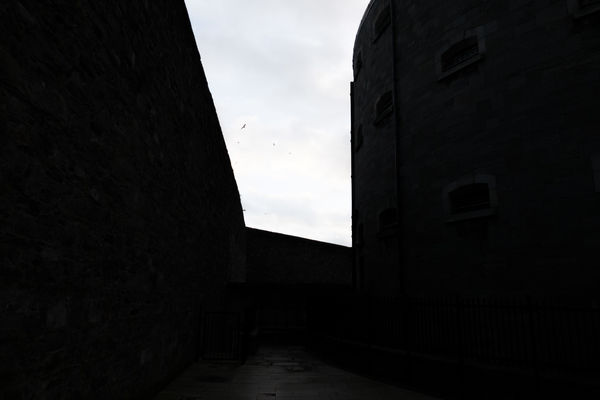How to deal with sky over exposing?
Jan 4, 2019 05:36:28 #
hobbit123
Loc: Brisbane, Australia
Probably a fairly basic question but whenever I take a shot that includes some sky it's always over exposed. The physics seem pretty simple, either the sky is exposed correctly (and the other stuff appears under exposed) or vice versa. I can't see how you can have a happy medium.
Am I missing something? Or do you correct in post?
Thanks
Am I missing something? Or do you correct in post?
Thanks
Jan 4, 2019 05:42:46 #
Jan 4, 2019 05:44:48 #
wdross
Loc: Castle Rock, Colorado
hobbit123 wrote:
Probably a fairly basic question but whenever I take a shot that includes some sky it's always over exposed. The physics seem pretty simple, either the sky is exposed correctly (and the other stuff appears under exposed) or vice versa. I can't see how you can have a happy medium.
Am I missing something? Or do you correct in post?
Thanks
Am I missing something? Or do you correct in post?
Thanks
Usually the only ways to darken the sky relative to the rest of the scene are to use a polarizer or shoot a series of shots and combine them in a HDR program.
Jan 4, 2019 05:45:23 #
Bracket you shots, Usually in a 3 shot series, -2,0,+2. Then you blend the images together in post.
Jan 4, 2019 05:56:58 #
While correcting in post is sometimes possible, too often there is nothing in the sky but grossly overexposure. Using bracketing, perhaps even clicking negative ev a bit will give you a great photo. A graduated filter is another possibility. Perhaps ecobin and hobbit should elaborate on a few details to be informative to the UHH population with less experience.
UHH does not charge by the word, so would you gentlemen elaborate .... How would you do the correction in post?
UHH does not charge by the word, so would you gentlemen elaborate .... How would you do the correction in post?
Jan 4, 2019 06:03:49 #
hobbit123
Loc: Brisbane, Australia
dpullum wrote:
While correcting in post is sometimes possible, too often there is nothing in the sky but grossly overexposure. Using bracketing, perhaps even clicking negative ev a bit will give you a great photo. A graduated filter is another possibility. Perhaps ecobin and hobbit should elaborate on a few details to be informative to the UHH population with less experience.
UHH does not charge by the word, so would you gentlemen elaborate .... How would you do the correction in post?
UHH does not charge by the word, so would you gentlemen elaborate .... How would you do the correction in post?
I've used the paint tool to pour some blue in there... but it ain't pretty :-)
Jan 4, 2019 06:11:41 #
mas24
Loc: Southern CA
As mentioned already. Correct in Post Processing. Or use a CPL Filter. Many will tell you that you need a very expensive one. You don't need a very expensive one. Tiffen, Hoya, and Breakthrough Brands, have some affordable ones available.
Jan 4, 2019 06:14:56 #
In post, use quick selection tool make a new layer and use a blue color filter is one way or replace the layer with a sky/clouds image or use landscape pro
Jan 4, 2019 06:15:00 #
I often bracket photos and merge them in Photomatix HDR Pro. Here are a series of three photos I bracketed. The lower one is the final version merged in Photomatix. It's especially good for interior shots where there's extreme contrast because of window light. For interior scenes you may even have to bracket five shots.
Normally exposed

(Download)
Underexposed 2-stops

(Download)
Overexposed 2-stops

(Download)
Final version merged in Photomatix

(Download)
Jan 4, 2019 06:15:33 #
Jan 4, 2019 06:18:23 #
hobbit123 wrote:
Probably a fairly basic question but whenever I take a shot that includes some sky it's always over exposed. The physics seem pretty simple, either the sky is exposed correctly (and the other stuff appears under exposed) or vice versa. I can't see how you can have a happy medium.
Am I missing something? Or do you correct in post?
Thanks
Am I missing something? Or do you correct in post?
Thanks
I shoot raw, measure the sky with the camera's spotmeter, set my exposure for 1.5 -2 stops more light than my camera's reading (getting as close to maximum exposure without blowing the highlights), then processing to reveal as much highlight and shadow detail as possible during raw conversion.
1. The rationale is simple. Shooting raw allows you to have ALL of the dynamic range your camera is capable of.
2. Using the spotmeter function gives you a simple, unprocessed reading of a narrow field of view - matrix, center weighted, spot with highlight protection generally will not provide a "clean" measurement.
3. If you read a highlight in which you want to preserve texture and detail, like a cloud, and use the reading without interpretation, the cloud will be gray and the rest of the scene will be severely underexposed and any attempt to recover the shadows will result in noisy, low contrast, less saturated images. Adding up to 2 stops of exposure will allow you to expose as high as possible without blowing the highlights while simultaneously allowing for better quality in the darker tones.
In this throwaway image below, I was trying to illustrate the above concepts to a friend. Disregard my exposure choices - we had just emerged from a very dark Irish jail tour (Kilmainham Gaol, in Dublin), and I did not reset the camera's ISO or aperture, and I used the camera's highlight protection spot meter mode, which automatically prevents overexposure regardless of what you read. (I was also learning a 2 week old camera while traveling which almost always results in "interesting" outcomes).
But the first image shows what the camera shot, with the sky just about blown out, and everything else very dark. The second is the result of some simple exposure, shadow, highlight, contrast, and curve adjustments to tame down the contrast. No, it didn't take 2 hours to get to the second image - it was more like 2 minutes. I was using a Sony RX10M4 bridge camera and Capture One Pro for post processing.
As you can see, this is not an ideal candidate for a graduated neutral density filter, and with quickly moving clouds and the camera hand held (which you will have to take on faith) a set of bracketed exposures was also pretty much out of the question. Not sure how a circular polarizer would have affected the sky, other than adding some blue - but the camera had already captured the blue in the sky - it was just almost overexposed. This was a single shot, recorded as a raw file, correctly adjusted in post processing. Most current cameras have sufficient dynamic range to all but eliminate the need for HDR merging for most landscape shots.
.
Jan 4, 2019 06:18:53 #
hobbit123
Loc: Brisbane, Australia
Thanks everyone for your responses so far. You guys are a mine of information!!
Jan 4, 2019 06:20:19 #
Can't see your photos. Can you try posting again? Forget it they are there now.
Jan 4, 2019 06:25:01 #
Avoid any post process editing. Learn to use the camera for it's worth by adding either a drop in or circular polarization filter.
Jan 4, 2019 06:28:45 #
billnikon
Loc: Pennsylvania/Ohio/Florida/Maui/Oregon/Vermont
hobbit123 wrote:
Probably a fairly basic question but whenever I take a shot that includes some sky it's always over exposed. The physics seem pretty simple, either the sky is exposed correctly (and the other stuff appears under exposed) or vice versa. I can't see how you can have a happy medium.
Am I missing something? Or do you correct in post?
Thanks
Am I missing something? Or do you correct in post?
Thanks
One of the ways you can balance this is using HDR (high density range) in your camera (if you have that) does not always work. Another way is to shoot Raw and take care of it in post. Another way is to shoot one shot for the sky, and another shot for the ground, and combine them in post. (you will need a tripod for this)
Or, you can get a Graduated Filter and holder for your lens, this will help you balance the shot in the camera.
If you want to reply, then register here. Registration is free and your account is created instantly, so you can post right away.









